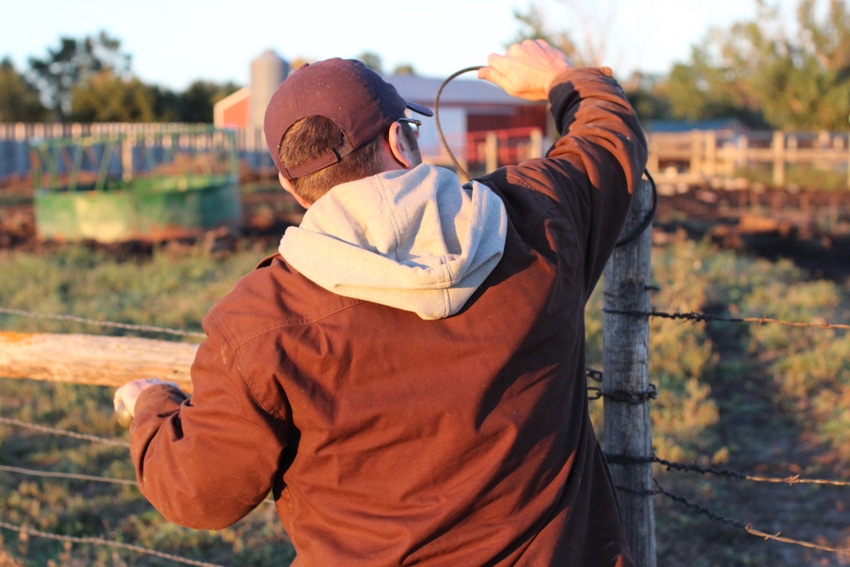Advocacy can be a gamble
Does it pay to promote and defend our industry? We can’t always guarantee a positive outcome, but we must continue to advocate.
October 22, 2018

I’ve been promoting beef pretty much my entire life. As a first-year 4-H member, my first county fair speech was about cattle, and I haven’t stopped talking about this industry since.
As a National Beef Ambassador, I had the opportunity to travel the country and interact with consumers.
As a college intern for the USDA in Washington, D.C., my roommate in the dorms at George Washington University was a vegan from New Jersey.
Blogging for BEEF, I’ve covered many consumer topics and trends over the last ten years.
And with my children’s book, “Levi’s Lost Calf,” I’ve introduced the concept of ranch life and beef production to elementary students across the country.
Each of these experiences have helped further my understanding about what our consumers want in their food and what they value most.
Despite some of the obvious differences between rural and urban America, it doesn’t matter where you live or if you’re a consumer or a producer. What I’ve discovered is we have many shared values when it comes to selecting food at the grocery store.
READ: Ag advocacy applies to family, too
Consumers and producers alike care about animal welfare, environmental stewardship, food safety, nutrition and taste. I believe no matter how far the gap may be between our urban consumers and ourselves, if we can find a common ground with those five values, we can earn consumer trust in who we are in production agriculture.
Yet, things don’t always work out perfectly. I can think of several instances, including myself, where agricultural advocates, eager to share their stories and be as transparent as possible, have visited with the media only to cringe when they discover what ends up in print.
In other cases, online conversations with consumers can quickly be derailed by vegan trolls. For example, I recently had a vegan comment on a photograph of my kids on Instagram where she implied that my children were unhealthy and in danger because I fed them beef.
I’ve been compared to Hitler. I’ve been called nasty names. I’ve been drug through the mud. I’ve been misquoted in print. It has been suggested (in gruesome details, might I add) that I should be slaughtered in a packing plant just like cattle. And the list goes on.
Despite the negativity, I will continue to advocate for the beef industry. I’m on a mission to build a legacy for my children. It’s my hope that they — being the sixth generation of ranchers in our family — will be able to continue to be involved in the beef cattle industry.
READ: Are we approaching agricultural advocacy all wrong?
For this to be possible, I must continue to step outside my comfort zone to promote the merits of cattle production and beef as a health food. I must face the adversaries head on. I must stay involved in politics, keeping an eye on the regulations that threaten to put our family ranch out of business.
Sometimes, my efforts will be successful. Remember my vegan roommate in Washington, D.C.? She was eating meat again by the end of the summer of living with me. How about the kids who listen to me read “Levi’s Lost Calf?” They’re learning about how ranchers care for animals and the land, a stark contrast to Disney movies where the animals are the stars and have bigger personalities than people.
However, sometimes my efforts will fail. Last week, a vegan college student reached out to me to visit about ag gag laws for a paper he was writing. In addition to a previous email interview, I spent nearly two hours on the phone, answering his questions and trying to be as honest and transparent as possible, all while realizing he disagreed vehemently with my worldview and how my family makes a living.
I’ll admit it was tough at times, but when we hung up the phone, I know I did my best. I put my heart on my sleeve. I explained how beef gets from pasture to plate in the simplest terms possible.
More than likely, I won’t change his mind about ranchers, and he won’t be eating meat anytime soon. Maybe my words will be used against me in the article he’s writing. Maybe he’ll twist what I said to make me out to be the Wicked Witch of the West.
READ: What's the best way to handle a biased reporter?
I could say no to these interviews. I could spend hours worrying about the final outcome. I choose to take on even the toughest of conversations because I feel those folks are going to be the most influential to other consumers.
How they respond to my honest answers isn’t my problem. However, being transparent and a little bit vulnerable is part of the deal if we want to connect urban and rural America once again.
It’s a responsibility each and every one of us has if we want to stay in business for generations to come. Yes, it’s a gamble. No, the odds aren’t in our favor that the outcomes will be positive every single time. However, if we don’t try, we put our industry and our livelihoods at risk, and that’s not something I want to take a chance on. Do you?
The opinions of Amanda Radke are not necessarily those of beefmagazine.com or Farm Progress.
About the Author(s)
You May Also Like




.png?width=300&auto=webp&quality=80&disable=upscale)
